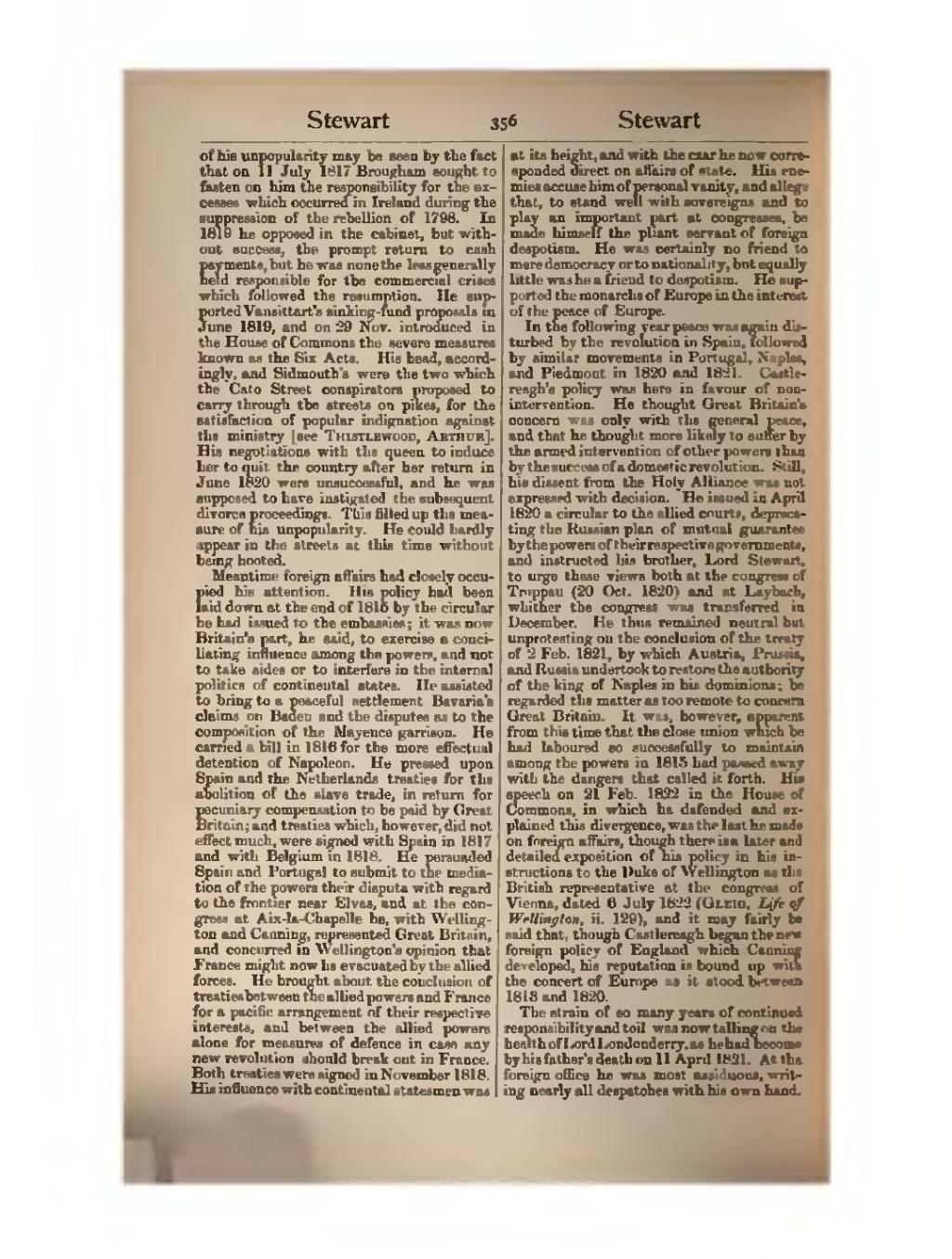of his unpopularity may be seen by the fact that on 11 July 1817 Brougham sought to fasten on him the responsibility for the excesses which occurred in Ireland during the suppression of the rebellion of 1798. In 1819 he opposed in the cabinet, but without success, the prompt return to cash payments, but he was none the less generally held responsible for the commercial crises which followed the resumption. He supported Vansittart's sinking-fund proposals in June 1819, and on 29 Nov. introduced in the House of Commons the severe measures known as the Six Acts. His head, accordingly, and Sidmouth's were the two which the Cato Street conspirators proposed to carry through the streets on pikes, for the satisfaction of popular indignation against the ministry [see Thistlewood, Arthur]. His negotiations with the queen to induce her to quit the country after her return in June 1820 were unsuccessful, and he was supposed to have instigated the subsequent divorce proceedings. This filled up the measure of his unpopularity. He could hardly appear in the streets at this time without being hooted.
Meantime foreign affairs had closely occupied his attention. His policy had been laid down at the end of 1815 by the circular he had issued to the embassies; it was now Britain's part, he said, to exercise a conciliating influence among the powers, and not to take sides or to interfere in the internal politics of continental states. He assisted to bring to a peaceful settlement Bavaria's claims on Baden and the disputes as to the composition of the Mayence garrison. He carried a bill in 1816 for the more effectual detention of Napoleon. He pressed upon Spain and the Netherlands treaties for the abolition of the slave trade, in return for pecuniary compensation to be paid by Great Britain; and treaties which, however, did not effect much, were signed with Spain in 1817 and with Belgium in 1818. He persuaded Spain and Portugal to submit to the mediation of the powers their dispute with regard to the frontier near Elvas, and at the congress at Aix-la-Chapelle he, with Wellington and Canning, represented Great Britain, and concurred in Wellington's opinion that France might now be evacuated by the allied forces. He brought about the conclusion of treaties between the allied powers and France for a pacific arrangement of their respective interests, and between the allied powers alone for measures of defence in case any new revolution should break out in France. Both treaties were signed in November 1818. His influence with continental statesmen was at its height, and with the czar he now corresponded direct on affairs of state. His enemies accuse him of personal vanity, and allege that, to stand well with sovereigns and to play an important part at congresses, he made himself the pliant servant of foreign despotism. He was certainly no friend to mere democracy or to nationality, but equally little was he a friend to despotism. He supported the monarchs of Europe in the interest of the peace of Europe.
In the following year peace was again disturbed by the revolution in Spain, followed by similar movements in Portugal, Naples, and Piedmont in 1820 and 1821. Castlereagh's policy was here in favour of non-intervention. He thought Great Britain's concern was only with the general peace, and that he thought more likely to suffer by the armed intervention of other powers than by the success of a domestic revolution. Still, his dissent from the Holy Alliance was not expressed with decision. He issued in April 1820 a circular to the allied courts, deprecating the Russian plan of mutual guarantee by the powers of their respective governments, and instructed his brother, Lord Stewart, to urge these views both at the congress of Troppau (20 Oct. 1820) and at Laybach, whither the congress was transferred in December. He thus remained neutral but unprotesting on the conclusion of the treaty of 2 Feb. 1821, by which Austria, Prussia, and Russia undertook to restore the authority of the king of Naples in his dominions; he regarded the matter as too remote to concern Great Britain. It was, however, apparent from this time that the close union which he had laboured so successfully to maintain among the powers in 1815 had passed away with the dangers that called it forth. His speech on 21 Feb. 1822 in the House of Commons, in which he defended and explained this divergence, was the last he made on foreign affairs, though there is a later and detailed exposition of his policy in his instructions to the Duke of Wellington as the British representative at the congress of Vienna, dated 6 July 1822 (Gleig, Life of Wellington, ii. 129), and it may fairly be said that, though Castlereagh began the new foreign policy of England which Canning developed, his reputation is bound up with the concert of Europe as it stood between 1813 and 1820.
The strain of so many years of continued responsibility and toil was now telling on the health of Lord Londonderry, as he had become by his father's death on 11 April 1821. At the foreign office he was most assiduous, writing nearly all despatches with his own hand.
